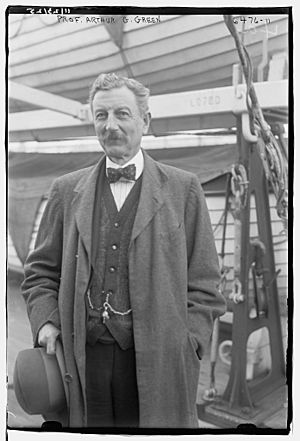Arthur George Green facts for kids
Arthur George Green was an important British chemist who lived from 1864 to 1941. He was known for his work in organic chemistry, especially with dyes.
Quick facts for kids
Arthur George Green
|
|
|---|---|

Professor Arthur G. Green in 1925
|
|
| Scientific career | |
| Fields | organic chemistry |
Contents
What Did Arthur Green Do?
Arthur Green studied at Lancing College and University College London. He learned a lot about chemistry there.
Discovering a New Dye
In 1887, Green was working in London for a company called Brooke, Simpson and Spiller. During this time, he made an exciting discovery. He found a new type of dye called primuline. This dye was special because it was made from a chemical called aniline.
Working with Dyes
In 1894, Green started a new job. He became a manager at the Clayton Aniline Company. He worked in their department that made different kinds of dyes. He stayed in this role until 1901.
From 1902 to 1916, Green became a professor. He taught about the chemistry of dyes and colors at the University of Leeds. This field is sometimes called "Tinctorial Chemistry."
Later, in 1916, Green joined the Levinstein company. He became the Director of Research there. He worked on new discoveries for the company until he left in 1923.
What Awards Did He Win?
Arthur Green received several important awards for his work.
Royal Society Fellow
In 1915, he was chosen to be a Fellow of the Royal Society. This is a very high honor for scientists in the United Kingdom. It means he was recognized as one of the best scientists of his time.
Medals for Chemistry
Also in 1915, he won a gold medal from the Worshipful Company of Dyers. This group supports the dyeing industry.
In 1917, he received the Perkin Medal. This award came from the Society of Dyers and Colourists. It recognized his important contributions to the world of dyes and colors.
 | John T. Biggers |
 | Thomas Blackshear |
 | Mark Bradford |
 | Beverly Buchanan |

